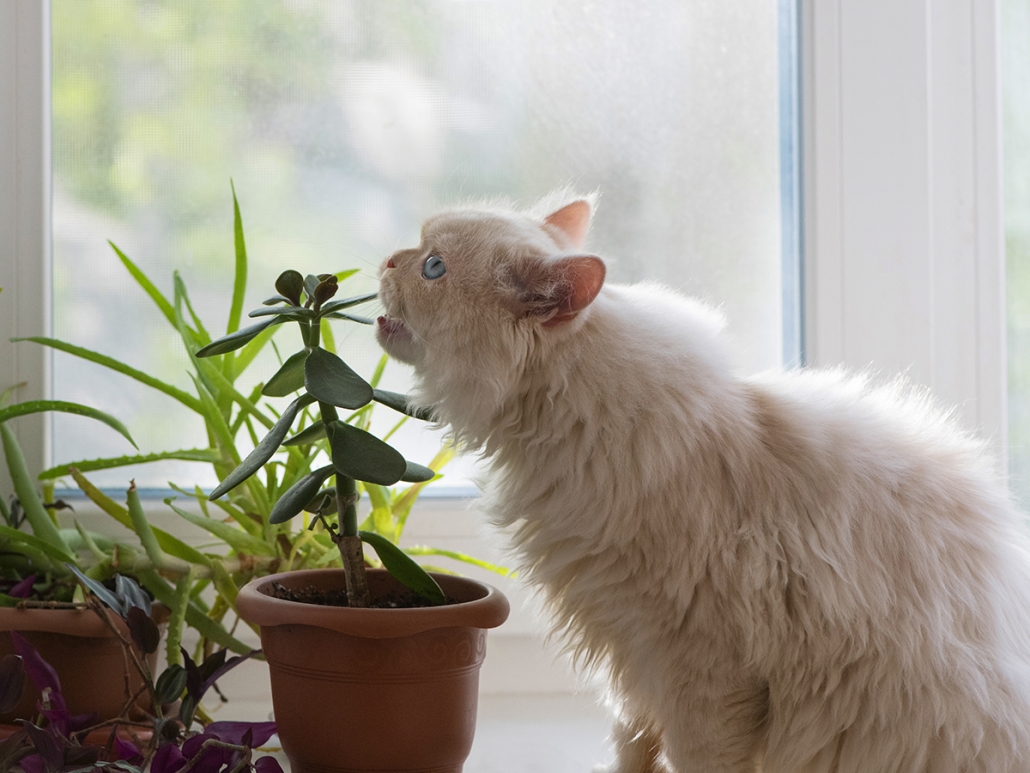Chew (or Don’t Chew) On This

By: Jacqui Dziak
COVID-19 restrictions have us spending more time at home and has led to the popularity of home gardening and growing indoor plants. Now in addition to posting adorable pictures of pets on Instagram, plant parents are also proudly showcasing their beautiful green babies. While indoor plants provide many benefits such as removing pollutants from the air and improving moisture levels in your home, some houseplants can be troublesome for our four-legged friends. In addition to protecting your furniture and shoes from pets with an inclination to chew, pet proofing your home includes being mindful of houseplants. Curious munchers will often gravitate toward plants. Therefore, it is important that any plants you cultivate in your home are safe and non-toxic for your pet. This also includes avoiding fertilizers. Keep in mind that just because a fertilizer is “natural” or “organic”, it does not mean it is “safe for pets.”
Below is a list of plants that are recognized by the ASPCA as being safe and non-toxic to dogs and cats, and a guide to help you add green (and color) to your home without worry:
- Gloxinia (Sinningia)
- African Violet (Saintpaulia)
- Baby Tears (Soleirolia Soleirolii)
- Banana (Musa)
- Venus Fly Trap (Dionaea muscipula)
- Areca Palm (Dypsis lutescens)
- Boston Fern (Nephrolepis)
- Prayer Plant (Calathea spp.)
- Friendship Plant (Pilea involucrata)
- Polka Dot Plant (Hypoestes phyllostachya)
- Peperomia (Peperomia)
- Orchid (Orchidaceae)
- Mosaic Plant (Fittonia spp.)
- Bromeliad (Bromeliaceae)
- Ponytail Palm (Beaucarnea recurvata)
- Purple Waffle Plant (Hemigraphis alternate)
- Royal Velvet Plant (Gynura aurantiaca)
- Haworthia (Haworthia)
- Air plants (Tillandsia)
- Cat grass or wheat grass
- Indoor herb garden
Rabbits see plants as food, so they will almost certainly take a bite of your houseplants. The safest greens to grow in your home if you are a rabbit parent are herbs, wheat grass and orchids. Although orchids are non-toxic, they are an expensive nibble for your rabbit. We recommend that you keep your orchids safely out of reach of rabbit’s sharp teeth. Rabbits also have a natural instinct to dig, so consider covering the dirt in any larger pots (such as an indoor herb garden) with stones, and offer your rabbit an alternative that will satisfy their desire to dig.
If you love surrounding yourself with houseplants, it is best to eliminate temptation as best as you can by keeping plants safely out of pet’s reach. Even non-toxic pants can cause an upset tummy and potential regurgitation. Consider hanging your plants high or keeping them in a room where your pet doesn’t roam. It can be difficult to redirect a pet with a determination to chew. Despite our best intentions, it is impossible to keep a watchful eye 24/7.
Always consider your pet when choosing a houseplant. Both pets and plants make a house a home, and you will be more delighted if the plant stays in the pot and your pet stays healthy and happy!


